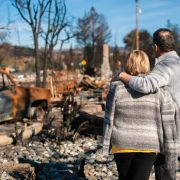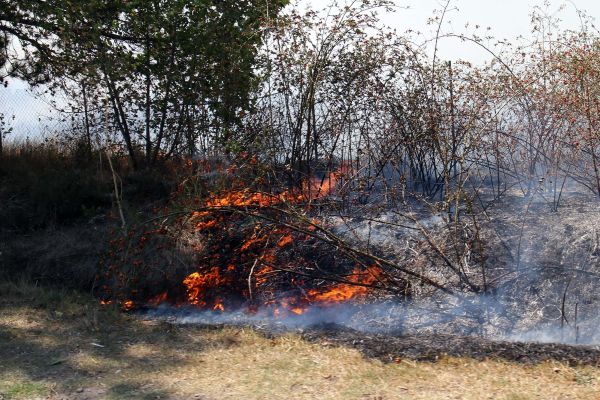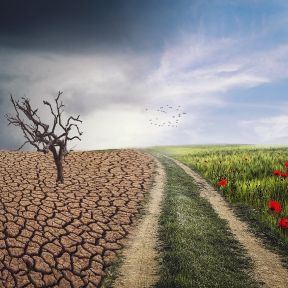
Disaster Psychology
Living through a disaster, whether natural or man-made, can take a serious toll on one’s mental health, both in the immediate aftermath of the disaster and for months or even years to follow. Wildfires, floods, earthquakes, tornados, terrorist attacks, warfare, and other life-threatening events can be traumatic and may trigger ongoing mental health symptoms like hyperreactivity, anxiety, or depression. And because disasters also often involve substantial losses of life and property, survivors may need to navigate complex feelings of grief and survivor guilt alongside the immense practical challenges of rebuilding their lives and communities.
The field of disaster psychology aims to understand the human impact of various disasters and identify tools to best support individuals and communities in the aftermath, immediately and over the long term. As our understanding of trauma and resilience grows—and as climate-driven disasters become more common around the world—it’s likely that psychologists, psychiatrists, and other mental health professionals will become an increasingly important component of disaster response.

Living through a disaster can affect mental health in a wide variety of ways. Common responses in the immediate aftermath of a disaster include insomnia, nightmares, fatigue, difficulty focusing, anger, and feelings of sadness or despair. With time, however, many individuals will be able to bounce back and return to their normal levels of functioning; research suggests this may be especially likely for someone who did not personally suffer substantial losses and/or who had a strong network of support.
Some individuals, however, may go on to have lasting negative psychological effects, including anxiety, persistent hopelessness, depression, suicidality, and post-traumatic stress disorder, which may be characterized by symptoms of hypervigilance, withdrawal, or flashbacks. While anyone can be affected by PTSD after a disaster, studies indicate that individuals who lost loved ones or homes, were seriously injured or at risk of death, had preexisting mental illnesses, or lacked social support and/or coping skills are at the greatest risk of developing PTSD.
Disasters can be and often are traumatic. However, many survivors—especially those who were on the periphery of the disaster or who did not experience substantial losses as a result, but not exclusively—may not necessarily view their experience as traumatic; this may be the case even if they are left with some lingering mental health symptoms such as stress or insomnia.
Research has found significant associations between wildfire exposure and poor mental health outcomes—including PTSD, depression, anxiety, anger issues, and substance use disorders, to say nothing of their physical health effects. Some long-term studies have found that these psychological consequences may endure as much as 10 years after the fire occurs.
Being exposed to warfare, whether as a combatant or as a civilian, can, unsurprisingly, bring a veritable tsunami of psychological casualties. Effects can include but are not limited to PTSD, depression, suicide, substance use, grief, and hopelessness. In some cases, there is evidence to suggest that the trauma of war can be passed down through generations, as the invisible wounds of war may change the way that survivors interact with their children and grandchildren even decades later.
Living through a serious disaster while others lost their lives can lead to what’s known as survivor’s guilt (or simply survivor guilt); some people may also experience survivor’s guilt by being comparatively less affected than others (that is, by not losing their home when others around them did). While this guilt is generally undeserved, it can be widespread and persistent; some studies have found that it can affect up to 90 percent of survivors in the immediate aftermath and, for a smaller percentage, may persist as much as 10 years after the disaster occurred.
Not all aftereffects of disasters are negative. Some survivors may go on to experience post-traumatic growth, recognizing their own inner strength and gaining a deeper appreciation for their loved ones or for life itself. Fortunately, some experts now believe that post-traumatic growth can be cultivated with talk therapy and other related interventions.

After a disaster, many communities prioritize material support. But psychological support is often just as critical and, when deployed quickly, can help affected individuals manage their symptoms, build resilience, and even, in some cases, experience post-traumatic growth.
During the disaster and/or in its immediate aftermath, disaster psychologists may be on hand to connect survivors with resources, help children and adults manage their fear and stress, resolve conflicts among affected individuals, and educate people on the wide range of normal disaster responses. Because affected communities are usually left in a state of shock after a disaster, and because many people will not show signs of mental health challenges for several weeks or months, disaster psychologists will also work to connect people with longer-term mental healthcare and teach coping skills to help survivors build resilience and manage new challenges as they arise.
In the immediate aftermath of a natural disaster, there are a few steps you can take to guard your mental health, including maintaining your routines as much as possible, practicing self-compassion, seeking support from loved ones, and being mindful of your news consumption. Once the danger has passed and life is returning to normal, seeing a therapist can help you navigate any ongoing mental health challenges and tap into your innate resilience.
There is no right or wrong answer. Many people find it hugely beneficial to seek therapy after a natural disaster—especially if they needed to evacuate, were injured, lost loved ones, or lost their home or other property—while others manage well without seeing a therapist. If you’re feeling stressed or have lingering mental health symptoms such as insomnia or anxiety, seeing a therapist, even for just a few sessions, may be right for your situation.
Psychological first aid (PFA) is an approach to supporting survivors in the immediate aftermath of a disaster. PFA aims to do three things: mitigate acute distress, prevent stress from worsening, and facilitate access to supportive care; when deployed quickly and correctly, proponents argue that PFA can reduce the incidence of PTSD in an affected community. While psychologists may be called in to administer PFA, volunteers and emergency response personnel may also be trained in the practice, allowing more people to be helped quickly and connecting more survivors to long-term mental healthcare.














